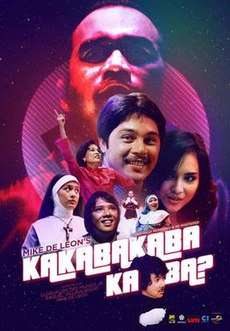Kakabakaba Ka Ba?
Kakabakaba Ka Ba? (lit. Does Your Heart Beat Faster?) is a 1980 musical-romantic comedy film produced by LVN Pictures (in its last offering) in 1980, with Mike De Leon as director.
| Kakabakaba Ka Ba? | |
|---|---|
 The poster of the restored version | |
| Directed by | Mike De Leon |
| Produced by |
|
| Written by |
|
| Starring |
|
| Music by | Lorrie Ilustre |
| Cinematography | Rody Lacap |
| Edited by | Ike Jarlego, Jr. |
Production company | |
| Distributed by |
|
Release date |
|
Running time | 104 minutes |
| Country | Philippines |
| Language | |
The film revolves on two couples who found themselves in conflict with the foreign commercial giants that control the Philippine economy, the Japanese and the Chinese. Moreover, it involved the Catholic Church which has a stranglehold on the Philippine society itself. The film reflects on the Philippine economy and society being primarily controlled by other forces for their own benefits and become instruments in performing illegal activities.[1] Actors Christopher de Leon, Sandy Andolong, Jay Ilagan and Charo Santos starred as main cast in the film, while Johnny Delgado and APO Hiking Society's Boboy Garovillo portrayed the main villains.
Plot
As he arrives home from Japan, Johnny (Christopher de Leon) unknowingly smuggles in high-grade opium via an unassuming audio cassette. Japanese gangsters go after him and his friends to take back their goods. Johnny's group takes refuge in a church in Baguio, but there they discover that the priests and nuns there are fakes and actually in league with the Japanese. Adding to the mayhem is the Chinese mafia, which have agenda of their own that pits them against the Japanese. Appropriately, hijinks ensue in a battle cum musical extravaganza.
Cast
| Actor | Character |
|---|---|
| Christopher De Leon | Johnny |
| Charo Santos | Melanie |
| Jay Ilagan | Nonong |
| Sandy Andolong | Nancy |
| Boboy Garovillo | Onota |
| Johnny Delgado | Pinoy Master |
| Armida Siguion-Reyna | Madame Lily |
| Leo Martinez | Padre Blanco |
| Nanette Inventor | Mother Superior |
| Joe Jardi | Wagner |
| Moody Diaz | Melody/Virgie |
| George Javier | Santacruzan |
| Dyords Javier | Grand Master |
| Jim Paredes | Conductor of the New Minstrels Band |
| UP Concert Chorus | fake priests and nuns |
The APO Hiking Society made a contribution in this film. While Buboy Garovillo and Danny Javier portrayed the characters of Onota (main villain) and Santacruzan (supporting role) respectively, Jim Paredes made a cameo appearance as the conductor for the New Minstrels Band in the finale.
Release
Original theatrical release
Kakabakaba Ka Ba? was released in the Philippines on August 8, 1980 by LVN Pictures. The film made its international release, starting in Japan on January 31, 1993. Aside from Japan, the film was also released in France on July 4, 2008 and Italy on May 6, 2011 as part of the Udine Far East Film Festival.
Digital restoration and re-release
The film was commissioned by ABS-CBN Corporation to be digitally restored and remastered by L’Immagine Ritrovata in Bologna, Italy and was supervised by Davide Pozzi. This is the first film in the ABS-CBN Film Archives entirely done abroad. The film was re-released with in select cinemas on December 9, 2015.
The restored version of the film made its television premiere on ABS-CBN's Sunday's Best on July 2, 2017 11:15PM. It was the first film to be broadcast under the Restored Classics banner. According to the Kantar Media-TNS statistics, the showing attained a 2.9% nationwide audience share.
Accolades
FAMAS Awards
| Year | Result | Category/Recipient(s) |
|---|---|---|
| Best Director Mike De Leon Best Supporting Actor Johnny Delgado Best Picture | ||
Urian Awards
| Year | Result | Category/Recipient(s) |
|---|---|---|
| Best Direction Mike De Leon Best Editing Ike Jarlego, Jr. Best Music Lorrie Ilustre Best Sound Ramon Reyes Best Supporting Actor Johnny Delgado | ||
| Best Supporting Actor Boboy Garovillo Best Supporting Actress Nanette Inventor Best Supporting Actress Armida Siguion-Reyna Best Screenplay Doy del Mundo Mike De Leon Raquel Villavicencio Best Production Design Raquel Villavicencio Best Cinematography Rody Lacap Best Picture | ||
See also
- Mike De Leon
- Christopher De Leon
- Charo Santos
- Jay Ilagan
- Sandy Andolong
- Johnny Delgado
- APO Hiking Society